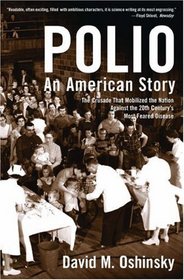Helpful Score: 5
This book was recommended to me by a friend who's a grad student in history - but with more free time on my hands, I managed to get through it more quickly than he did. I never thought that I would find a book about the history of Polio deeply fascinating. That man can write. I am not normally a history buff but this book was extremely engaging and difficult to put down. Oshinsky did a wonderful job of portraying the personalities involved in the epic, from FDR to Foundation officials to the scientists working on the vaccine. The politics involved in this story - one might even say, the drama - struck me as impressive. My other favorite thing about the book was the way Oshinsky put polio in context. Gender, class, conceptions of disability, race, the Cold War, the media - no aspect is left unturned. It's a great exposition of a time in the country when many of our parents were growing up. It was wonderful to read a piece of nonfiction that was so difficult to put down. It's short, but it packs a punch.
I highly recommend it. Five stars.
I highly recommend it. Five stars.
Helpful Score: 1
"Polio" is a completely readable account of how the war waged on several fronts eradicated polio in America. This is a gripping narrative of the terror America faced as polio inflicted its crippling effects indiscriminately on adults and children and even the President of the United States. Unconventional research, not possible today, was done in a race against time by several fiercely competitive scientists pitting completely different vaccine models against each another while vying for millions of March of Dime dollars to bring an end to this public scourge. "Polio" is one of the most fascinating non-fiction books I've read in quite a long time.
I'm old enough to remember, having been born in 1947, when polio was a threat in the back of our minds. I've always had some questions as to whether it was Salk or Sabin who should receive credit for eliminating this worry from families. This book answered those questions.
But, more disturbing was the concept of how the "polio appeals" created the basic formats for fund raising campaigns for other diseases and causes. That may be the dark side of this book.
If you enjoyed this book, then I highly recommend "The Great Influenza." It is very much like "Polio," but covers the Spanish flu of 1918-1920, which killed more people than World War I. "The Great Influenza" covers a longer period of time than "Polio," starting with the initial emergence of "modern American" medicine during the Civil War, the accreditation of medical schools, creation of medical labs, and the terrible effects of the epidemic, often caused by many of the political forces and jealousies found in "Polio."
But, more disturbing was the concept of how the "polio appeals" created the basic formats for fund raising campaigns for other diseases and causes. That may be the dark side of this book.
If you enjoyed this book, then I highly recommend "The Great Influenza." It is very much like "Polio," but covers the Spanish flu of 1918-1920, which killed more people than World War I. "The Great Influenza" covers a longer period of time than "Polio," starting with the initial emergence of "modern American" medicine during the Civil War, the accreditation of medical schools, creation of medical labs, and the terrible effects of the epidemic, often caused by many of the political forces and jealousies found in "Polio."
This book goes through many different aspects of polio in America. From stories of people who struggled with polio (including FDR) to the various scientists and researchers who fought to find a cure to the continued struggle to defeat polio worldwide. It makes the fight against polio very real for those of us that were not around to see it firsthand. Overall, a great book.
Fascinating book about the history of poliomyelitis,its effect on the world and the development of an acceptable polio vaccine. I would definitely read this again.




